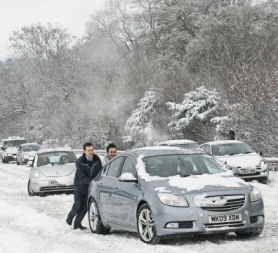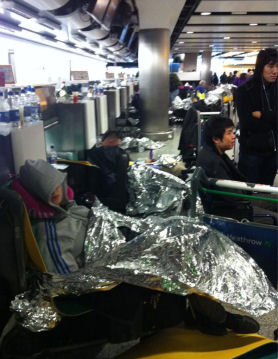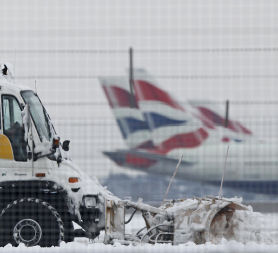UK snow strands air travellers
Freezing conditions brings chaos to Heathrow, Britain’s biggest airport, as the severe weather continues and parts of the country grind to a halt.
Widespread travel chaos caused by some of the severest winter weather for a century left Christmas commuter plans in tatters and swathes of the country paralysed today.
Delays and cancellations at a host of UK airports continued to hit thousands of passengers, while plummeting overnight temperatures left almost the entire road network caked in black ice.
After shutting yesterday, Heathrow said it would not be letting any flights land on its runway, with only a “handful” of departures taking place, pouring misery on hundreds of stranded people who were forced to spend the night in terminals. Just a handful of planes managed to leave Heathrow – while hundreds of flights were cancelled around the country, leaving Christmas travel plans in chaos.
Edinburgh Airport closed this morning, before reopening for departing flights only. Aberdeen Airport also had to close for some of the day for de-icing.
Gatwick Airport reopened after planes were grounded for large period of yesterday, but widespread disruption was expected with officials advising passengers to check with their airline before travelling.
Birmingham Airport, Exeter Airport, Bristol Airport, Cardiff Airport, Southampton Airport, Glasgow Airport, Newcastle Airport, Luton Airport, Stansted Airport remained open but warned of disruption to flights.
Hundreds of thousands of Britons had been due to fly this weekend, with four million expected to go abroad, according to travel association Abta.

Stranded at Heathrow
Twitter user @paullomax told Channel 4 News he spent around seven hours on the tarmac at Heathrow yesterday, before hearing that his flight to New York for the first leg of a family Christmas visit to Canada had been cancelled.
“I don’t know what will happen – we might be spending Christmas in the UK,” Mr Lomax said. The earliest possible slot in which he could leave London looks like Christmas Eve – one day after the family are due to fly from New York to Halifax in Canada.
He returned to Heathrow’s terminal three today in an attempt to collect the family’s baggage, which could not be removed from the plane yesterday for safety reasons. He arrived at Paddington at around 8am today, but was unable to get on a Heathrow Express train until lunchtime, where he joined an hour-long queue to find out more about the bags.
“Heathrow T3 looks like a war zone – debris, foil blankets and camping passengers”, he posted on the social networking site.

Pictured left: Travellers at Heathrow. Credit: Paul Lomax
Singer Lily Allen was one of the travellers caught up in the chaos after boarding and then being forced to disembark from a plane at Heathrow yesterday.
A spokeswoman for Heathrow, which experienced temperatures of minus 5.2C overnight, said ealier: “Heathrow Airport will not be accepting arrivals on Sunday, and will only manage a handful of departures as our airfield team continues to deal with the impacts of yesterday’s bad weather and prepares the airport for a full reopening on Monday.
“We are extremely sorry for the disruption this will cause to passengers and airlines and we stress that passengers must check with their airlines before travelling to the airport. We will provide regular updates.
Forecasters said the UK was hit by abnormally low temperatures overnight, with most parts of the country struggling to get over minus 5C.

Weather experts said temperatures would struggle to rise above freezing, meaning large accumulations of snow, which left many people stuck in their homes yesterday, would fail to clear.
The AA dealt with 16,000 calls yesterday, compared with 9,000 on an average Saturday pre-Christmas.
According to the Met Office, snow falls this month have been the heaviest for December in nearly 20 years.
If the second half of the month is as cold as the first, this will be the coldest December on record since 1910.
Professor Mike Lockwood from Reading University told Channel 4 News the way the sun affects the jet stream means we are set for more severe winters in years to come.
The “little ice age” sets a precedent for winters like this, he said. “It was not exclusively cold but there are more [cold winters], and this could go on for 200 or 300 years.
“We’ve grown used to mild winters and we should be prepared for cold winters even in a globally warming world we have to be prepared for cold winters. We’ve actually had 30 or so years with very few cold winters.”
But instead he said the country should be prepared for more cold winters in the future, which has big implications.
“Practices like ready-to-go deliveries may not be the way to go,” he said. “We may have to warehouse things like we used to.”